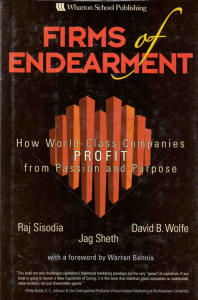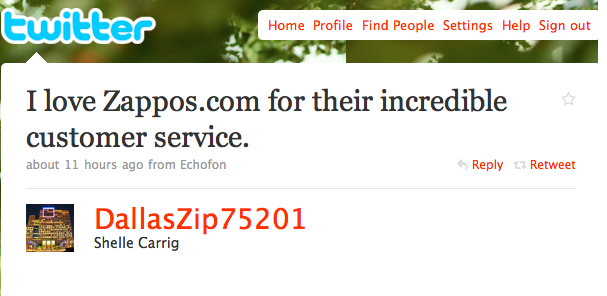..
.
.
Do you–
1. Operate from a higher purpose and make decisions from this place?
2. Act on behalf of all stakeholder groups (society, partners, investors, consumers, employees and the environment)?
3. Lead from a place of consciousness?
4. Create a culture, management team, and systems that maximize the values and purpose of the company?
These four principles (higher purpose, stakeholder integration, conscious leadership, and conscious culture and management) define conscious businesses. The term firm of endearment is a metaphor for businesses that follow the model of stakeholder relationship management, in which employees, customers, suppliers and the community–in addition to shareholders–are regarded as true stakeholders in a business.

The book “Firms of Endearment” demonstrates how companies that work to ‘endear’ themselves to all stakeholders can outperform those that don’t. “Firms of Endearment” reflects the principles and tactics of conscious business; co-author Raj Sisodia is a founder and chairman of the Conscious Capitalism Institute. As Jim Collins’ “Good to Great” was an authoritative text for 20th century business that wanted to beat the odds, “Firms of Endearment” will be for evolutionary business that will attract profit on account of their deep purpose.
The 18 companies analyzed in “Firms of Endearment” (including BMW, Johnson & Johnson, Whole Foods, and Southwest Airlines), demonstrated a 1025% cumulative return over 10 years, compared to 316% for Good to Great companies and 122% for S&P 500 companies.
But how do you shape your company into a firm of endearment? How do you generate value that’s social, emotional and financial? What is it that glints the eye and elicits unrequested praise from your employees, consumers, suppliers, community, and investors when they talk about you?

To support companies in becoming conscious businesses Sisodia partnered with the consulting firm Axialent, which serves as the training arm of the firms of endearment process. Starting with a culture assessment, Axialent helps companies understand where they stand against each of the four pillars of conscious capitalism. From this, Axialent identifies the ‘gap’ between a company’s current state and full potential, and then supports this growth through leadership training, cultural shift and system creation.
In the simplest form, the organization tackles complex business challenges (think multinational corporations) by focusing on human issues. When we sync business to personal values, we find our objectives to be shared and well meaning: compassion for one another, generosity toward others, stewardship of our backyards, integrity and respect. Acting from these values, a company produces positive social change of a kind that far surpasses CSR or Secretary’s Day.





 I'm Olivia Khalili. I created Cause Capitalism to show you how to grow your business by incorporating a social mission.
I'm Olivia Khalili. I created Cause Capitalism to show you how to grow your business by incorporating a social mission. 
